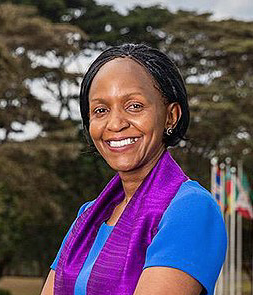
Valerie Ann Amos, Baroness Amos, is a British Labour Party politician and diplomat who served as the eighth UN Under-Secretary-General for Humanitarian Affairs and Emergency Relief Coordinator. Before her appointment to the UN, she served as British High Commissioner to Australia. She was created a life peer in 1997, serving as Leader of the House of Lords and Lord President of the Council from 2003 to 2007.

Sir Stephen Rothwell O'Brien, is a British politician and diplomat who was the United Nations Under-Secretary-General for Humanitarian Affairs and Emergency Relief Coordinator. O'Brien assumed office on 29 May 2015, succeeding Valerie Amos.

An internally displaced person (IDP) is someone who is forced to leave their home but who remains within their country's borders. They are often referred to as refugees, although they do not fall within the legal definitions of a refugee.

The United Nations Assistance Mission in Afghanistan is a UN Special Political Mission tasked with assisting the people of Afghanistan.

Jan Egeland is a Norwegian diplomat, political scientist, humanitarian leader, and former Labour Party politician who has been Secretary General of the Norwegian Refugee Council since 2013. He served as State Secretary in the Norwegian Ministry of Foreign Affairs from 1990 to 1997 and as United Nations Undersecretary-General for Humanitarian Affairs and Emergency Relief Coordinator from 2003 to 2006.

The United Nations Office for the Coordination of Humanitarian Affairs (OCHA) is a United Nations (UN) body established in December 1991 by the General Assembly to strengthen the international response to complex emergencies and natural disasters. It is the successor to the Office of the United Nations Disaster Relief Coordinator (UNDRO).
The Central Emergency Response Fund is a humanitarian fund established by the United Nations General Assembly on 15 December 2005 and launched in March 2006. With CERF's objectives to 1) promote early action and response to reduce loss of life; 2) enhance response to time-critical requirements; and 3) strengthen core elements of humanitarian response in underfunded crises, CERF seeks to enable more timely and reliable humanitarian assistance to those affected by natural disasters and armed conflicts.
There are a number of meanings for the term humanitarian. Here, humanitarian pertains to the practice of saving lives and alleviating suffering. It is usually related to emergency response whether in the case of a natural disaster or a man-made disaster such as war or other armed conflict. Humanitarian principles govern the way humanitarian response is carried out.

The United Nations Assistance Mission for Iraq (UNAMI) was formed on 14 August 2003 by United Nations Security Council (UNSC) Resolution 1500 at the request of the Iraqi government to support national development efforts.
A United Nations Resident Coordinator is the highest United Nations official and the chief of UN diplomatic mission in a country.
The Humanitarian Coordinator is the senior-most United Nations official in a country experiencing a humanitarian emergency. The Humanitarian Coordinator is appointed by the United Nations Emergency Relief Coordinator when a new emergency occurs or an existing humanitarian situation "worsens in degree and/or complexity".

Catherine Bragg served as United Nations Deputy Emergency Relief Coordinator in the Office for the Coordination of Humanitarian Affairs between February 2008 and March 2013. Bragg obtained a PhD in Criminal Justice from the University at Albany, SUNY, a Master of Philosophy in Criminology from the University of Cambridge and a Bachelor of Science in Psychology from the University of Toronto.
The Inter-Agency Standing Committee (IASC) is an inter-agency forum of United Nations and non-UN humanitarian partners founded in 1991 to strengthen humanitarian assistance. The overall objective of the IASC is to improve the delivery of humanitarian assistance to affected populations. The Committee was established following UN General Assembly Resolution 46/182 and resolution 48/57 confirmed that it should be the primary method for inter-agency coordination. The committee is chaired by the Emergency Relief Coordinator.

Humanitarian aid during the Syrian civil war has been provided by various international bodies, organizations and states. The main effort is coordinated by Jonh Ging of the United Nations Office for the Coordination of Humanitarian Affairs (UNOCHA). In 2014, U.N. Security Council Resolution 2165 authorised humanitarian aid to be supplied via four border crossings not controlled by the Syrian government, generally to supply rebel-controlled territory.
Philippe Lazzarini is a Swiss-Italian humanitarian who has been serving as Commissioner-General of the United Nations Relief and Works Agency for Palestine Refugees in the Near East (UNRWA) since 2020.

Thomas Stuart Francis Fletcher CMG is a British diplomat and writer who has served as Under-Secretary-General for Humanitarian Affairs and Emergency Relief Coordinator since 2024.

Sir Mark Andrew Lowcock is a British economist and accountant who served as the United Nations Under-Secretary-General for Humanitarian Affairs and Emergency Relief Coordinator between 2017 and 2021. Prior to his appointment by United Nations Secretary-General António Guterres on 12 May 2017, Lowcock was the Permanent Secretary of the Department for International Development (DFID) from June 2011 to September 2017.

Joyce Msuya is a Tanzanian microbiologist and environmental scientist who has been serving as Assistant Secretary-General for Humanitarian Affairs and Deputy Emergency Relief Coordinator in the United Nations Office for the Coordination of Humanitarian Affairs since 2021. From 2018 to 2021, she served as the Deputy Executive Director of the United Nations Environment Programme (UNEP) at the level of Assistant Secretary-General.

Martin Griffiths is a British diplomat who served as Under-Secretary-General for Humanitarian Affairs and Emergency Relief Coordinator at the United Nations from 2021 to 2024.
The Office of the Special Envoy of the Secretary-General for Yemen is a United Nations office created in 2012 to assist the Secretary-General for Yemen.












